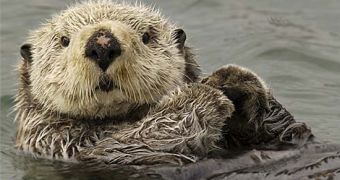A new research warns that, by the looks of it, male otters living in the UK have witnessed their reproductive systems being affected by water pollution, and that humans could soon find themselves going through rather similar problems.
Long story short, wildlife researchers maintain that, courtesy of their inhabiting polluted rivers and thus becoming exposed to harmful chemical compounds, the country's male river otters have experienced a decrease in the size of their reproductive organs.
As the researchers explain, this basically means that the very survival of the species is at stake, simply because the otter's breeding behavior and patterns stand to also be affected by such physiological changes. The Inquisitr informs us that, although it is very much true that industrial pollution was listed as one of the major culprits behind the UK's male otters growing to have smaller reproductive organs than their ancestors, the fact remains that sewerage systems can also be blamed for this problem.
Thus, it is being said that, whenever people make use of various drugs, significant amounts of endocrine disruptive chemicals get flushed and eventually make their way into the otter's natural habitats.
As far as wildlife researchers and several other specialists are concerned, otters are a so-called indicator species, meaning that whatever problems they experience more often than not end up affecting both other animals and even humans.
Dr. Eleanor Kean, of Cardiff University's School of Biosciences, commented on the species' importance in monitoring changes in the environment as follows: “The otter is an excellent indicator of the health of the UK environment, particularly aquatic systems.”
“Persistent organic pollutants were banned in the 1970s, but other chemicals, in current usage, are not yet being monitored in wildlife,” she went on to add.
This study into how environmental pollution affects the reproductive systems of male otters was carried out by scientists working with Chemicals, Health and Environment Trust, the Cardiff University Otter Project and the UK Environment Agency.

 14 DAY TRIAL //
14 DAY TRIAL //